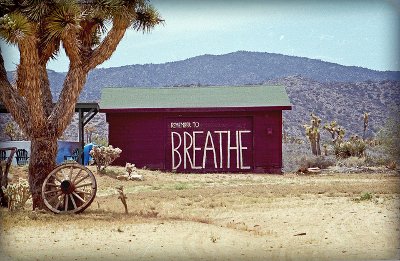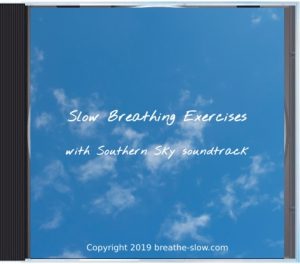Breathing to Reduce Stress and Blood Pressure
Stress and high blood pressure – what’s the connection?
If you have high blood pressure and if you find yourself frequently stressed then there’s a good chance that your stress could be at least partially causing your high blood pressure.
Now, there’s no absolute proof that stress causes sustained high blood pressure in the long-term, although it seems pretty likely.
However, there is proof that as you become stressed your blood pressure starts rising. Thankfully, there’s also proof that doing something to lower your stress levels can in turn lower your blood pressure.
NOTE: If you’re interested in slow breathing only for stress reduction and/or anxiety relief, rather than lowering blood pressure, click here: Slow breathing exercises for anxiety
How does stress increase blood pressure?
The fact is, our bodies and minds are highly responsive to all kinds of things. Any time you feel stressed, you’re not only experiencing a change in your mental and emotional state but all kinds of things are going on physically too. Your heart rate will rise, and with it your blood pressure, and you might also find yourself sweating or getting flushed and anxious.

Stressed image by patriziasoliana on Flickr.com
Scientists call it the “fight or flight” response – your body’s preparing itself to either fight the situation or flee from it. And while this is a very healthy response if you’re actually in danger, it’s not so helpful if you’re getting stressed out by non-life-threatening things on a day to day basis.
That’s not to diminish the significance of the things which are stressing you out but just to recognise that in these situations you need to learn get a handle on your response. It’s obviously not pleasant to be stressed (I know because I am a stress monkey extraordinaire) and it’s not healthy either.
It’s not only taking a toll on your blood pressure but on other aspects of your health as well. Stress suppresses the immune system, for example, making you more susceptible to colds and infections.
So instead of getting stressed about that (!) just do something about it. Easier said than done, right? Well, for once doing something about it is actually fairly easy. This is because one of the most effective – and fastest – ways to reduce stress and blood pressure is slow breathing.
Slow breathing to reduce stress and blood pressure
Sounds too simple maybe but it’s true. Breathing slowly is all you need to do. Breathing more deeply too will help, using your diaphragm not just your upper chest. But the main thing is just slowing down your breathing.
The first thing is to try to notice when you’re becoming stressed as early as possible, before it takes too much of a hold of you. (This can be tricky and can take some practice, so don’t worry if you’re already in full panic mode before you realise. Just gradually train yourself to get in the habit of paying attention to how you’re feeling now and again. And gradually you can teach yourself to notice the warning signs of a stress-out coming in advance.)
The second thing is to then pay attention to your breathing and just slow… it… down. Don’t worry about breathing deeply, or from your diaphragm – although this is helpful too. Just try to slow down each breath, one at a time, gradually, until you are noticeably breathing more slowly.
How does slow breathing reduce stress and blood pressure?
If this sounds suspiciously simple, well it just is. And it’s not new news either. Slow breathing to reduce stress and blood pressure is an ancient technique that all kinds of healers, yogis, meditators have advocated for centuries. And now modern doctors are getting in on it too.
Cardiologist Dr. Herbert Benson formalised the medical concept of the “relaxation response” in the 1970s – i.e., inducing a state of deep physical relaxation. Building on the insights and benefits of traditional meditation techniques, he developed several methods of invoking deep relaxation as a means of countering stress and anxiety. These include mindfulness meditation, progressive muscle relaxation and simply focusing on your breathing. (You can read more about this on our sister website: Stress and hypertension and what to do about it.)
Medical research has been continuing apace since then. And there are now countless studies demonstrating the many physical and mental benefits of regularly accessing this state of deep relaxation. Lowering stress and lowering blood pressure are among the most immediate benefits.
NOTE: Even if you’re not stressed, slow breathing still lowers your blood pressure 🙂 Click here for details: How slow breathing lowers blood pressure
Advantages of slow breathing to reduce stress and blood pressure

photo: Patricia Barden, flickr.com
As I’ve mentioned, there are quite a few different things you can do to stop your stress rising and start to relax instead. However, slow breathing is the simplest, the most accessible (you don’t need anything except your lungs!), and the most direct.
As the American Institute for Stress (stress.org) states,
At AIS we are often asked, “What is the best way to relive my stress and relax?” Our typical answer includes an explanation that just as the definition of stress is different for everyone, so are “the best” stress reduction techniques. However, there is one “Super Stress Buster” that evokes the relaxation response that we widely recommend as useful for everyone – even kids. Can you guess what it is? BREATHING! That is right, simply breathing. It is free and can be practiced anywhere – I bet you are even breathing right now! The key, of course, is focused breathing.
Slow breathing for short- and long-term stress and blood pressure reduction
Starting to breathe more slowly will immediately start to bring your stress levels and your blood pressure down. One study found that breathing slowly for a few minutes lowered blood pressure even more than just sitting quietly at rest for a few minutes.
However, if you practise slow breathing every day (or most days), you can keep your blood pressure and stress levels down more generally. There haven’t been long-term studies of the effects of regular slow breathing yet. However, the early evidence suggests that even just a few months of daily slow breathing practice results in generally lower blood pressure.
The other advantage of regularly practicing slow breathing to reduce stress and blood pressure is that you’ll get better at it. It will feel more natural to do it. So that when you find yourself in a horribly stressful situation and feel your tension start to rise, it will be much easier to remind yourself to slow down your breathing. And it will be much easier to actually do it.
So get in the habit of setting aside fifteen minutes each day to sit, lie or stand somewhere quiet and just breathe slowly and steadily.
Now, all along I’ve been saying this is simple, and it is. However, if you’ve ever tried meditating, you’ll know that sometimes the simplest things can be the hardest to focus on. Luckily the solution is also simple – just breathe along to some guided slow breathing audio tracks!
Guided slow breathing to reduce stress and blood pressure
 If you’ve been anywhere else on this website, you’ll know that we have created guided slow breathing audio tracks specifically for this purpose. You can listen to samples of them here: Breathe-Slow audio samples
If you’ve been anywhere else on this website, you’ll know that we have created guided slow breathing audio tracks specifically for this purpose. You can listen to samples of them here: Breathe-Slow audio samples
There are five sets of tracks, with breathing prompts for different breathing paces.
The fastest (and probably closest to your natural breathing rate) is 10 breaths per minute (that’s ten breaths in, ten breaths out). Then there’s 8, 6, 5, and 4 per minute. So you can gradually work your way down to slower and slower breathing rates as you get more used to it, for deeper relaxation.
For each breathing pace, there are four different tracks. Three have different kinds of background music, since listening to music has also been shown to be beneficial for lowering stress and blood pressure. The fourth track just has the breathing prompts. This is in case you prefer to play your own music in the background, or you might just like to listen to the breathing prompts on their own.
Anyway, have a wee listen and see what you think. If you think you’ll find them helpful then you can buy them as a digital download and get started right away.
Buy Breathe-Slow audio tracks
Our entire Breathe Slow collection of guided slow breathing audio tracks is now available for $17 (about £13 or €15).
You’ll get a total of twenty audio tracks: four tracks for each of the five breathing cycles – 10, 8, 6, 5, and 4 breaths per minute. (For each breathing cycle, three of the four tracks have different types of background music and the fourth track has no background music – just the breathing prompts.) So you can always choose a track to suit your desired breathing rate and your musical mood!
Click on the button below to get an immediate download and start using now:

The Breathe-Slow audio tracks come with a 60 day no-questions-asked 100% money-back guarantee if you’re not completely satisfied with your investment. Note that this is a digital download ONLY – no CDs will be sent to you.
To order physical CDs, click here:
(note that the physical CDs do not include the 4 breaths per minute tracks)
Whatever you do, just remember that lowering your stress and blood pressure is simple: just breathe… more… slowly….
And smile 🙂
Breathing to reduce stress: references and further information
Harvard Heart Health – Breath Control to Quell Stress Response
Stress.org – Take A Deep Breath
Harvard Heart Health Blog – Take a Deep Breath
Psychology Today – Dr. Benson’s Relaxation Response
Post by Alison.

